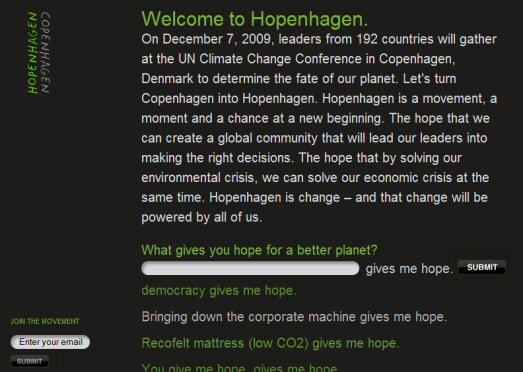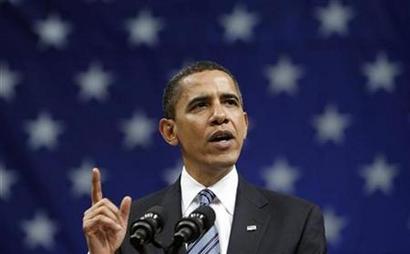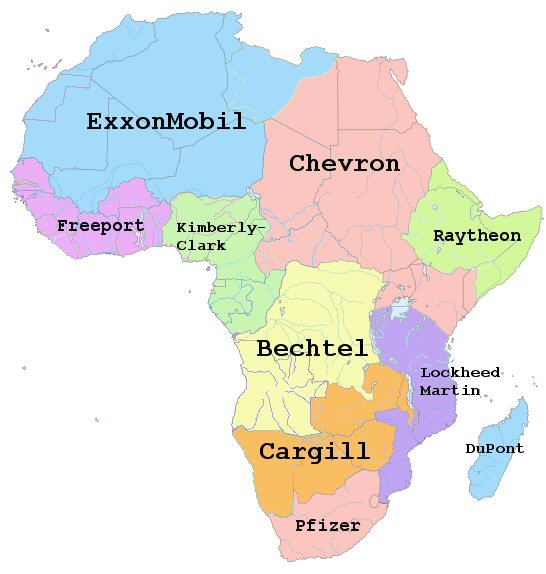
A new campaign was launched a few days ago, with the blessing of the United Nations: it’s called Hopenhagen. There is clearly a huge level of creative genius behind the name (ok, I’m being sarcastic), as you can tell it is a portmanteau word, consisting of “hope” and “copenhagen”, and indeed it is intended to be the start of a massive advertising push to provide “a platform for individuals around the world to participate and have a say in the future of the world.”
That last bit was extracted from the Hopenhagen press release, as issued by IAA Global:
(June 23, 2009 – Cannes, France) The United Nations, together with the International Advertising Association and a coalition of the world’s leading advertising, marketing and media agencies today launched Hopenhagen – a movement that empowers global citizens to engage in the December United Nations Climate Change Conference (COP15) in Copenhagen – at the Cannes Lions International Advertising Festival. Hopenhagen is a global marketing and communications initiative that will inspire and generate mass activation around the world.
“Climate change is one of the epic challenges facing this and future generations. World leaders will come together for the Copenhagen climate change conference in December and every citizen of the world has a stake in the outcome. It is time to seal a deal. We need a global movement that mobilizes real change,” said UN Secretary-General Ban Ki-moon. Hopenhagen is about more than hope. “It is about global action for a global climate treaty and a better future for humankind,” Ban added.
Delegates from 192 nations will meet in December in Copenhagen to ratify a new international global climate treaty, which will take effect when the first commitment period of the Kyoto Protocol expires in 2012. Recognizing the tremendous role that communications will play leading up to and during the Conference, the United Nations engaged the global advertising and media industry through the International Advertising Association (IAA) to develop a comprehensive communications program to drive public awareness and generate action. Hopenhagen will complement the UN’s “Seal the Deal!” campaign, which calls on world leaders to “unite to find a solution to climate change that is fair, balanced, effective and science-based.”
“Climate change is a universal challenge, and we believe the world’s citizens are ready to act – they are just seeking the right platform,” said IAA Executive Director Michael Lee. “The strategy and stunning creative concept for the Hopenhagen idea came from WPP’s Ogilvy & Mather team, digital framework and direction were developed by MDC Partner’s Colle+McVoy, and the global PR and messaging plans spearheaded by Omnicom’s Ketchum. The collaboration that has taken place among the world’s leading agencies to develop this campaign for the United Nations is unprecedented and a testament to the significance the industry places on the need for action to address climate change.”
This raises a hell of a lot of questions: not least that if Hopenhagen is the brainchild of an industry that depends on continuous consumer spending for its existence, how could it be sustainable in any way? More worrying, though, that the advertising industry seems to have the support of the United Nations.
While on the surface Hopenhagen appears to have United Nations approval, there is actually nothing on the press release that links the two organisations (IAA and UN) directly. Have they used authority by association? It turns out that the UN are actually a big part of this. A United Nations press release from 2008, says:
SECRETARY-GENERAL LAUNCHES PUBLIC AWARENESS PARTNERSHIP BETWEEN UNITED NATIONS,
ADVERTISING LEADERS FOR NEW GLOBAL AGREEMENT ON CLIMATE CHANGE IN COPENHAGEN
A new public awareness partnership to support United Nations-led efforts to promote a new global agreement on climate change in Copenhagen next December was launched today by United Nations Secretary-General Ban Ki-moon and more than 20 advertising industry leaders of the international advertising community.
Initiated by the International Advertising Association (UN-IAA), and timed to coincide with the opening of the sixty-third United Nations General Assembly and the fifth annual Advertising Week in New York, the new partnership marks a milestone in private sector support for action on climate change. The partnership builds on the International Advertising Association’s social responsibility programmes with the United Nations, a desire by the organizers of Advertising Week to galvanize the forces of the advertising community for a common, larger good, and support from the most powerful leaders of the global communications industry to come up with strategic solutions to one of the most important issues facing the planet today.
Michael Lee, Executive Director of the International Advertising Association, said, “It has become increasingly clear that the complexities of climate change issues present a communications challenge with both policymakers and the general public. The global ad community can make a significant contribution to help change consumer behaviour, influence public policy, and help the UN make further progress on this issue. The ultimate selling proposition might just be saving the planet.”
Mr. Ban stated, “We need action on climate change, and I applaud the determination of the advertising industry to help. As climate change affects everyone, everywhere, the UN needs partners in the private sector and in civil society to mobilize and spur action. Now is the time for action, and we welcome this assistance from the advertising community, which will bolster our present capacities.”
So has the advertising industry decided to abandon its work ensuring infinite economic growth and stop working with corporations; has the United Nations gone corporate and made the 2009 Copenhagen Summit a front for business as usual; or has the IAA stymied the UN entirely, leaving the UN thinking (with its collective mind) this is a really good idea for the planet?
The first question is easy to address — go to the IAA Global website, and straight away you see who the big players are in the organisation:

I also know, from various experiments carried out, that any anti-corporate messages on the laughable “global community” message page are deleted from the message list (that doesn’t mean I don’t encourage you to try and ruin the database). After getting the message total up to 90,000 — with the help of a few good friends — the counter was reset overnight, and the list became moderated. In fact, I suspect that now the only reason the counter is going up is because members of IAA are adding their own messages. Clearly any dissenting views will not be tolerated: we can Hope for change, but it won’t happen through Hopenhagen.
Which means that either the UN is a corporate body; or they have been greenwashed.
It would be tempting, if not satisfying, to think the latter — surely the United Nations wouldn’t take the corporate shilling in place of standing up for the planet in general, would they?
But they would. As I showed in this article about the Climate Group (“businesses and civil society are all discovering that the move towards a low-carbon economy, far from costing the Earth, can actually save money and invigorate growth“), Ban Ki-Moon doesn’t miss an opportunity to mention economic growth in his speeches — listen for yourself, next time he speaks. But here’s the real clincher: the UN’s own Seal The Deal campaign (basically a petition) which was mentioned in the Hopenhagen press release above is, above all, an attempt to ensure the global economy can continue growing (my emphasis below):
On December 7, world leaders will gather in Copenhagen, Denmark, to respond to one of the greatest challenges facing humanity: climate change and sustainable economic growth. But how to protect the planet and create a green economy that will lead to long-term prosperity? The negotiations in Copenhagen will need to answer this question. Our existence depends on it.
Reaching a deal by the time the meeting ends on December 18 will depend not only on political negotiations but also on public pressure from around the globe. Public support must be galvanized. To do this, the United Nations has launched “Seal the Deal”, a campaign that encourages users to sign an online, global petition which will be presented to world leaders. The petition will serve as a reminder that world leaders must negotiate a fair, balanced and effective agreement in Copenhagen, and that they must seal a deal to power green growth, protect our planet and build a more sustainable, prosperous global economy that will benefit all nations and all people.
If you know what “green growth” means then please tell me, but as is very clear indeed; economic growth is what has caused the global environmental situation we see now. As I wrote in a recent Earth Blog article:
“The rich and powerful have no intention of changing; they want things to carry on as they have done since Industrial Civilization was first created. For them, the worst thing that can happen is for the Economy that has fed their – and our – dreams to power down and fail. For the planet, and every single natural habitat, food web and species on it, the best thing that can happen is for that destructive thing called Economic Growth to be turned on its head, and buried for good.”
As for this horrible little, advertising driven campaign known as Hopenhagen: it’s greenwashing, and nothing more.














